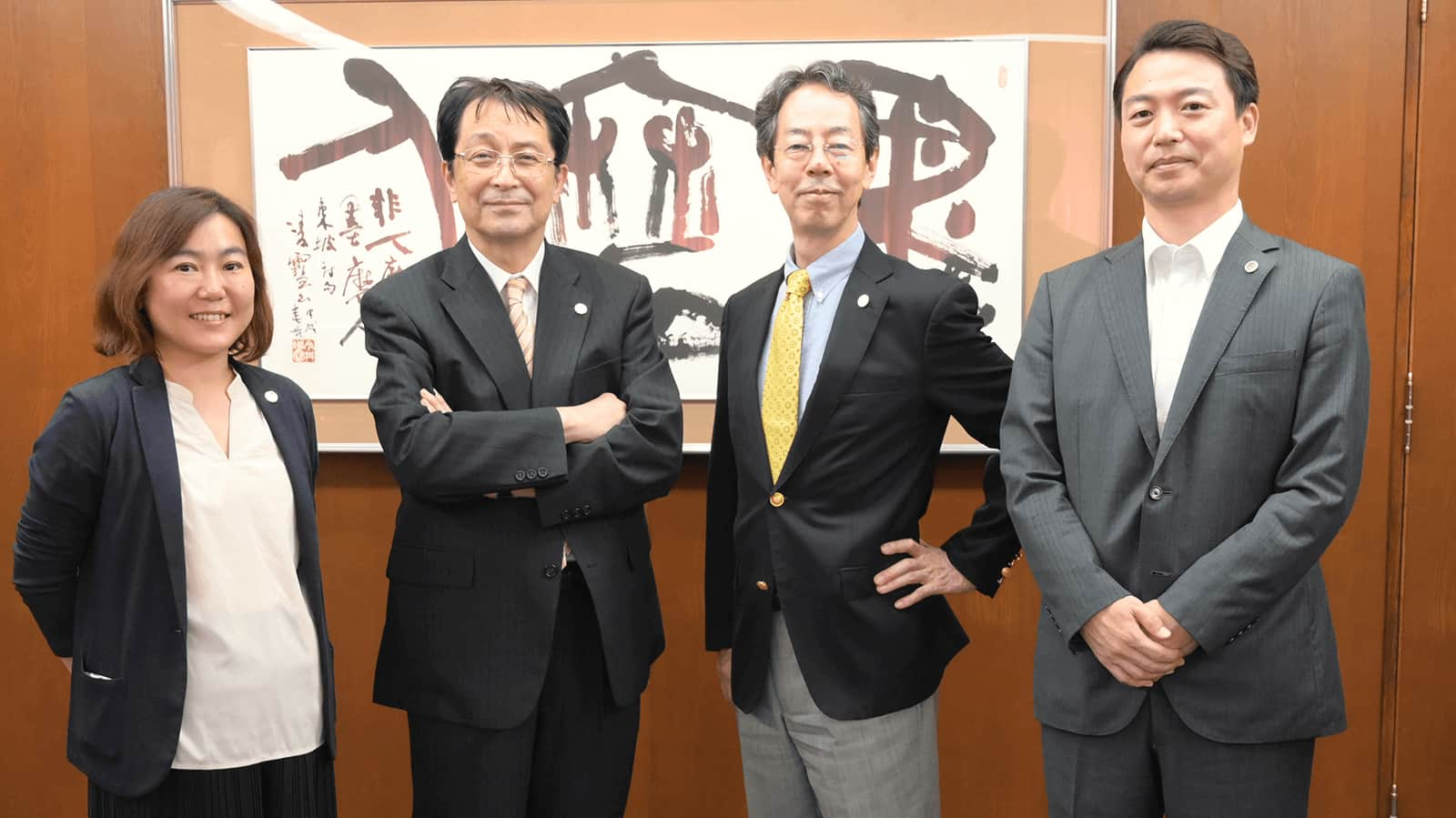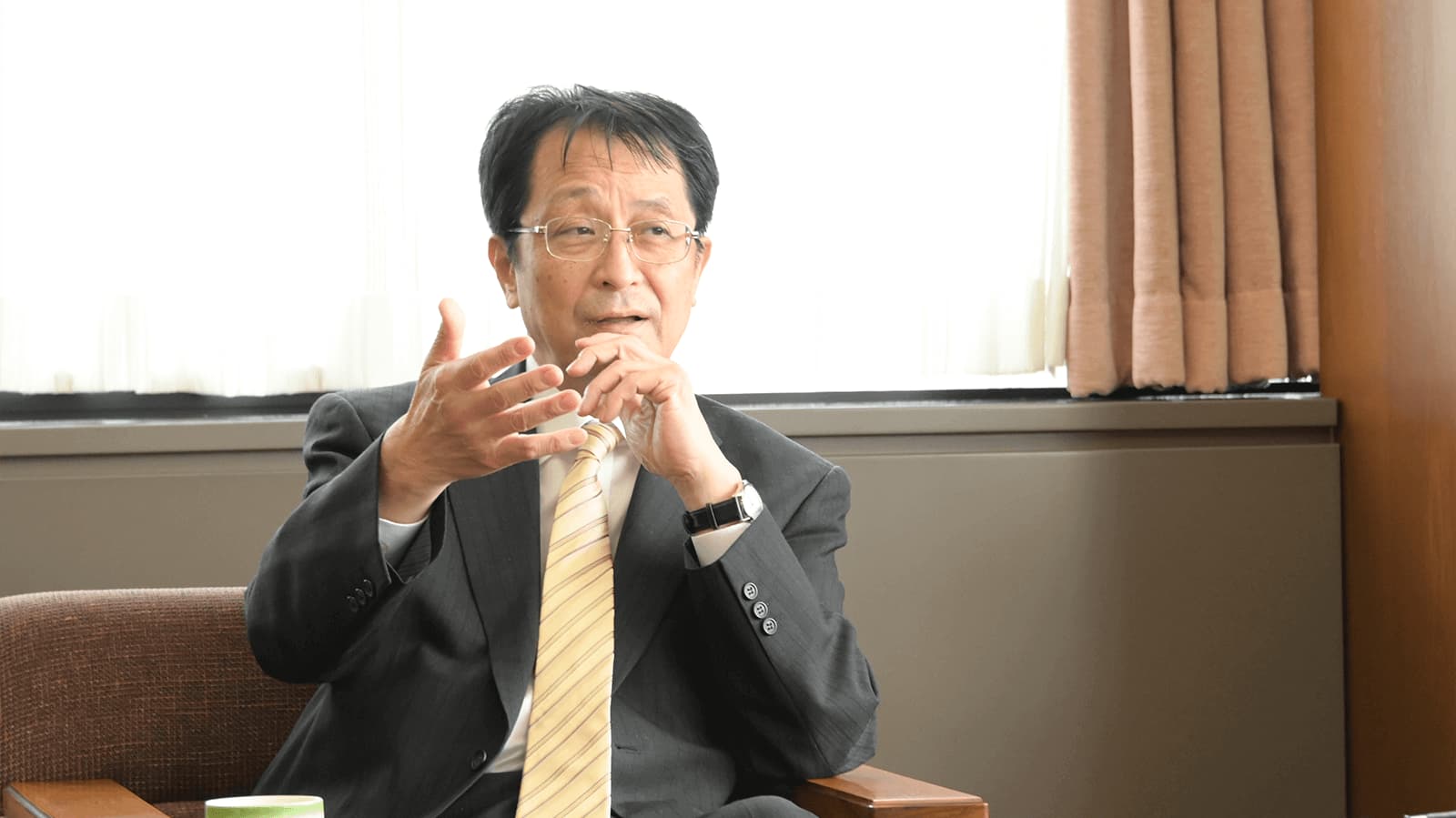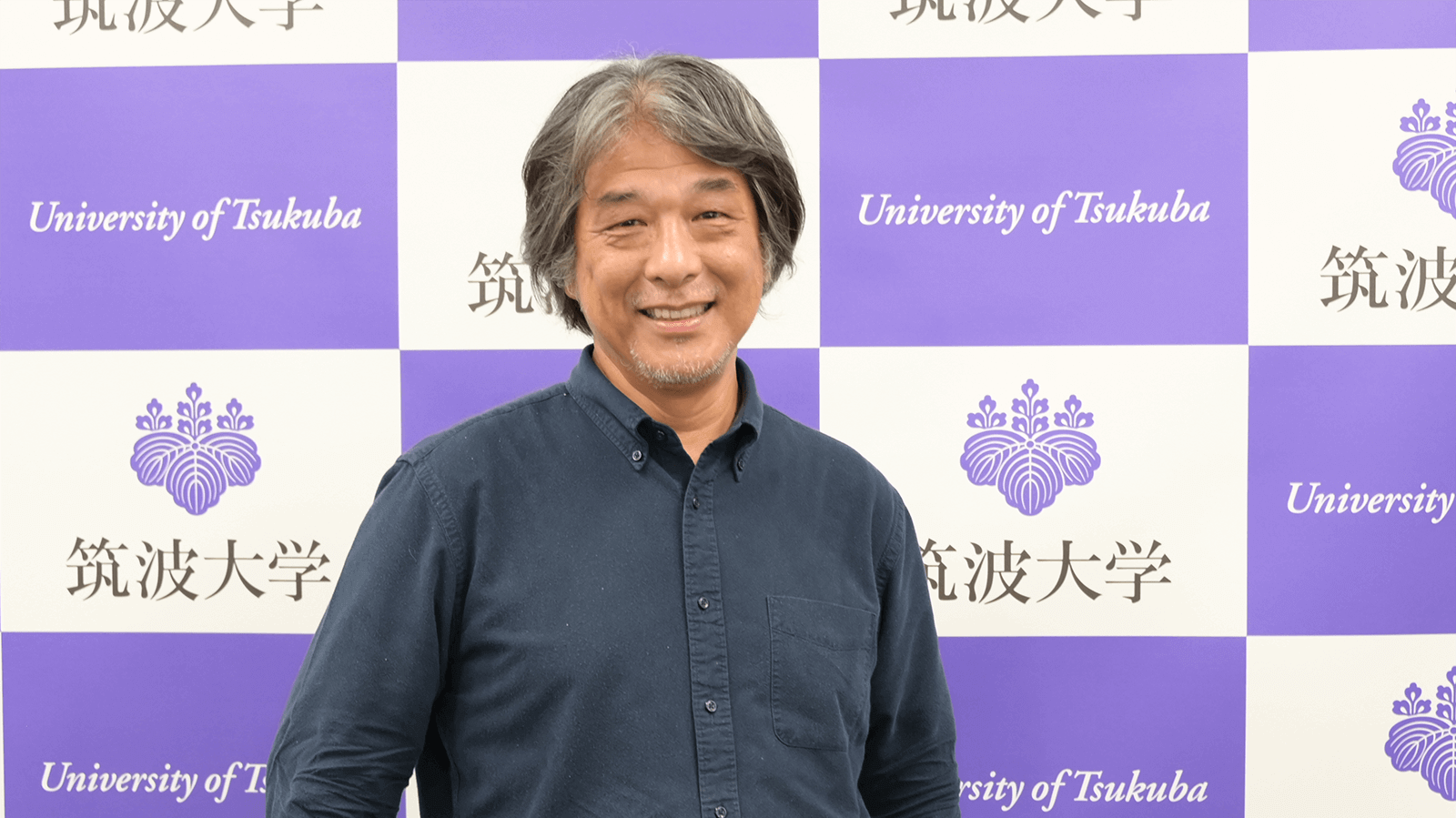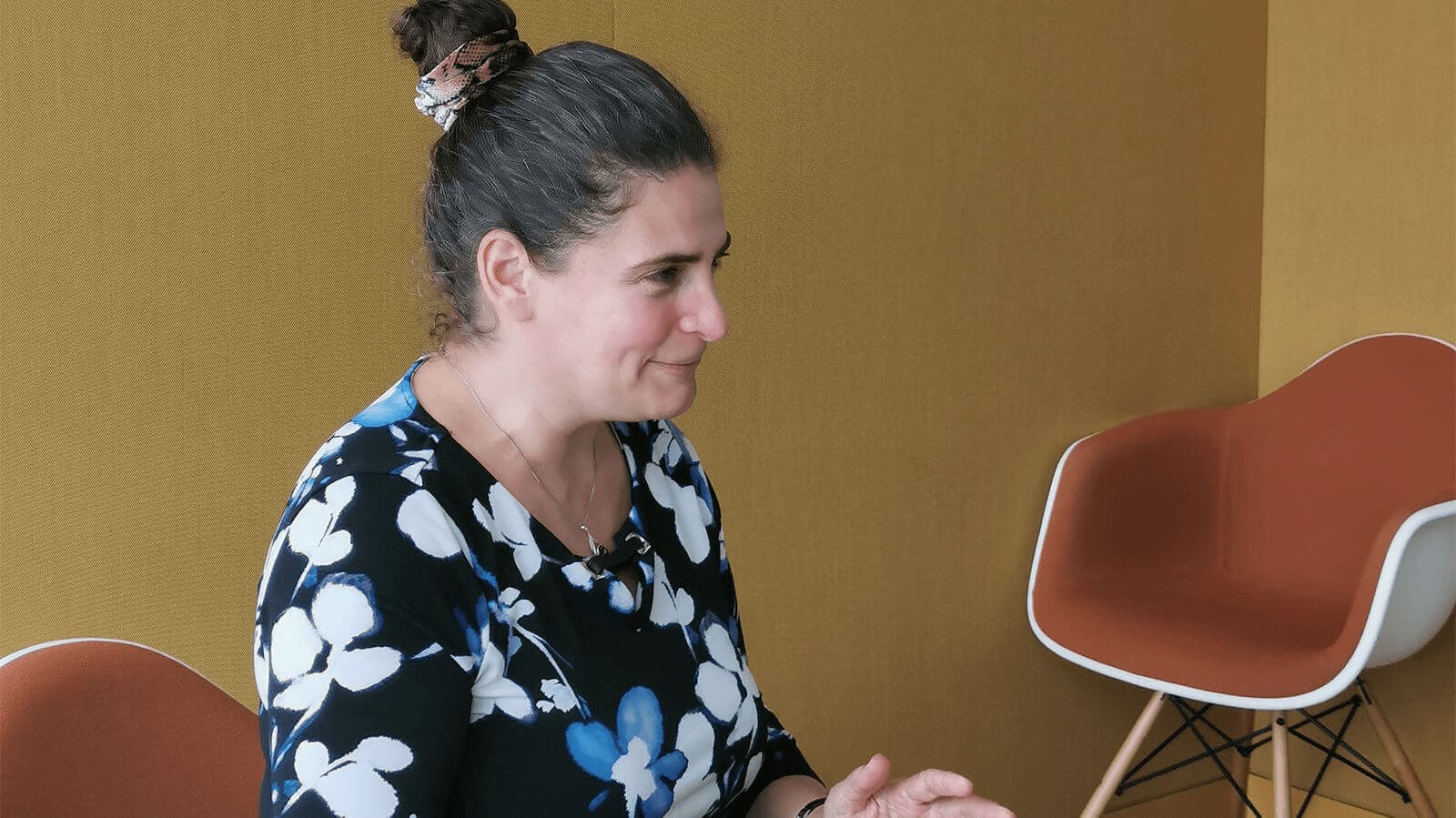An Inspiration for All Women in Nagoya University
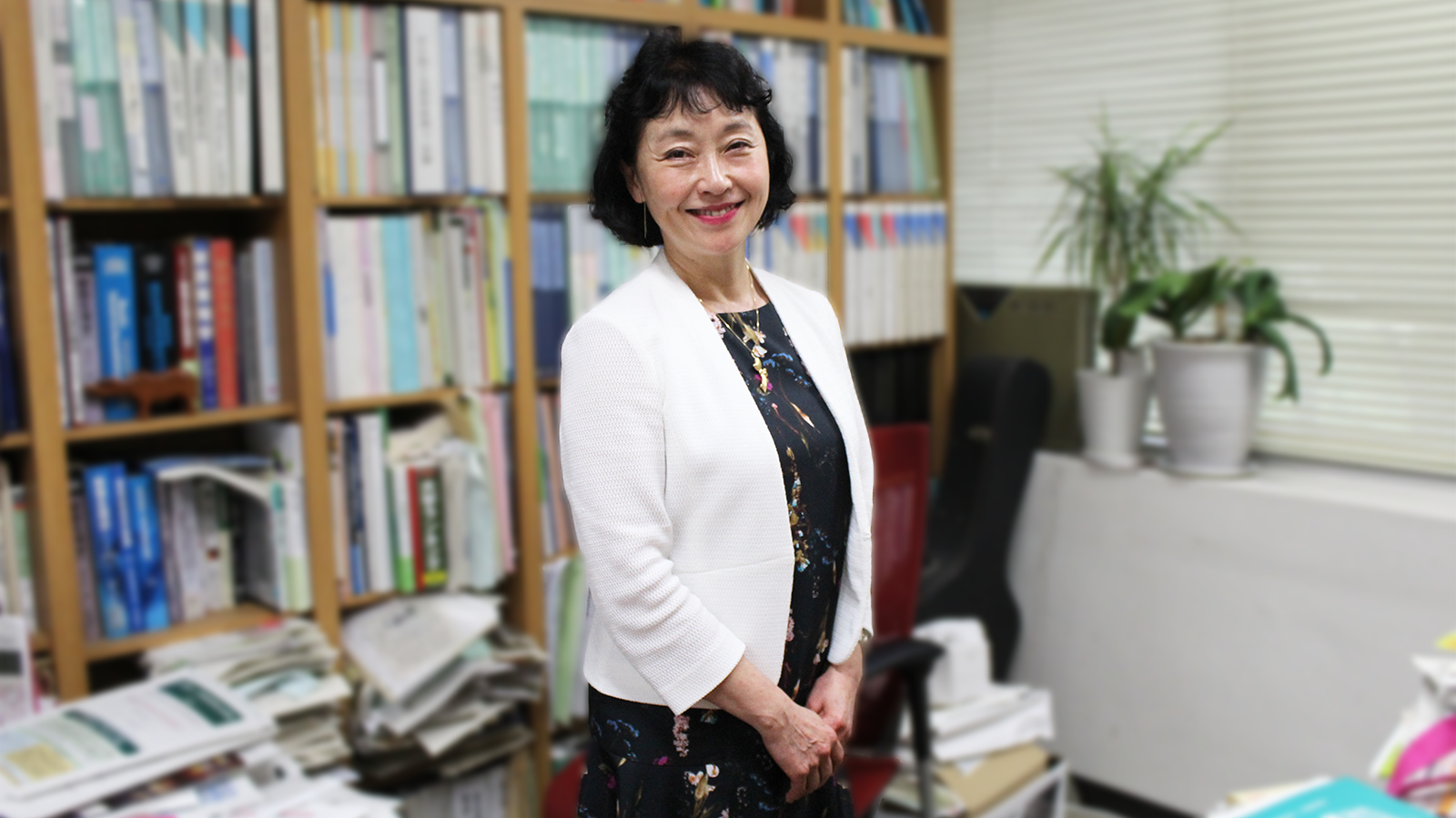
Here is the woman who started it all.
Hiroko Tsukamura started Nagoya University’s on-campus childcare facilities, and she made gender equality a key aspect of the university’s management strategy. The Nagoya University of today can be attributed to Hiroko’s efforts. She is an inspiration to fellow women academics. In this interview, she describes how to live positively, without yielding, when facing a career crisis.
Interviewer: Makoto Yuasa
Researchers’ Community for Child Care Support at Nagoya University: A Grassroots Initiative
[Makoto] The Researchers’ Community for Child Care Support seems unique.
[Hiroko] The most interesting fact about it is that it isn’t a university-led initiative; it was started following an initiative by the women themselves. Many women academics, upon accepting a university job, move away from their partner and take their children with them. Women who were in similar circumstances decided to form the community to support one another. I think this is praiseworthy.
[Makoto] Nagoya University is famous for the progress it has made in gender equality.
[Hiroko] Yes, the university’s gender equality efforts have a long history. After the Basic Act for Gender-Equal Society was enacted in 1999, the university wasted no time to establish a working group and began examining next steps. In 2002, the university was the first to establish the Center for Gender Equality (then known as the Office for Gender Equality). Since then, it has consistently strived for gender equality. During this period, it was selected for four MEXT funding programs for supporting women academics. The university makes efforts to support women staff. For example, the university has provided on-campus childcare facilities, including a nursery and after-school care. It has established a system for recruiting female principal investigators (known as the “framework for recruiting women professors and women assistant professors”). It also appoints assistants for women academics who are raising children. In 2015, the UN Women’s HeForShe Project selected Nagoya University as one of the top 10 universities contributing to gender equality.
A Support System that Includes Childcare Provision
[Makoto] It was your efforts that led to the establishment of an on-campus nursery and after-school care facility. What gave you the idea?
[Hiroko] Although everyone was voicing ideas of empowering women and people were organizing the odd event or discussion, everything was transitory. I wanted less talk and more action, and I wanted this action to result in something concrete. So, I started advocating the idea of demonstrating the university’s commitment to gender equality through something concrete. Initially, I thought about starting a nursery. That was the starting point.
[Makoto] Why a nursery?
[Hiroko] At the time, the campus already had a municipally licensed nursery. However, there were two problems with it. First, as a municipally licensed facility, it was only accessible to Nagoya city residents. If your address was outside Nagoya city or if you were a non-Japanese national on a short-term stay, you were not permitted to use the facility. Second, the women needed a nursery that was run more flexibly. For example, the nursery required parents to participate on weekend jumble sales and to contribute to the nursery’s management. The women, who were already too busy, wanted to use the nursery. But some would be put off by the extra work that this would entail. As a result, some mothers would hesitate about having a second child or even abandon the idea. So, I felt that it was necessary for the university to organize a nursery with a significantly higher level of freedom.
[Makoto] Carrying out your research, managing your classes, and providing constant care for a child as a solo parent—all of this means being incredibly busy, doesn’t it? How about the after-school facility? What was the inspiration behind that?
[Hiroko] The chances of women leaving academia are high not only when they give birth. In fact, a similar high attrition can be seen around the time the child enrolls in elementary school. This is known as the “Elementary grade 1 wall.” The nursery can offer extensive hours of care, up until 9 pm, if parents have an urgent situation to attend to. But once children enter elementary school, they come home early. This situation compels many mothers to think of quitting their careers. In an effort to overcome the “Elementary grade 1 wall,” we took the initiative to provide our own after-school facility. So, in a pioneering move for Japan—including the corporate/industrial sector—we voluntarily provided a facility with regular childcare services during weekdays.
[Makoto] That is amazing!
[Hiroko] When I thought of establishing the childcare facilities, I thought that I myself might use the facilities one day. However, I had to spend a lot of time and effort to convince people of the childcare facilities plan, and it took four-and-a-half years until the plan was realized. By then, I was too old to have children. The dilemma of whether to have children or pursue their careers is something that women continue to face alone. But I trust that we will reach a stage where women do not have to sacrifice their careers for the sake of their children. I don’t want any more women to undergo what I did. That is why I try to ensure that we do everything possible at the university level.

The Benefits of a Double Income
[Hiroko] People tend to see gender equality as a women’s issue, but this is a misconception. Society is beginning to question men’s working styles as well, and there is a growing understanding of LGBT. Gender equality means enjoying equal chances to work to your full potential regardless of your gender. I communicate this idea to a variety of people. In this case, for instance, since you are a man, it might make more sense to you if I explain it as follows. In the past, Nikkei surveyed male employees and asked them whether they can say “no” to their bosses. As many as 85% of the respondents answered that they could not refuse an order from their boss.
[Makoto] As many as 85%? That is a very distressing statistic.
[Hiroko] Isn’t it? But here’s the really interesting thing: If you just look at the responses from the men in their 40s whose partners also work, the results are reversed. More than 60% of these respondents answered that they can refuse their boss’s order. Do you understand the significance of this finding? How about you, Makoto? Does your partner work?
[Makoto] My wife left her job when we got married. She’s now a full-time mother to our two-year-old twins.
[Hiroko] So you are the sole income provider for your household. Have you ever experienced any difficulties because of this situation—monetary or otherwise? Do you ever worry, for instance, about how your family will cope if, God forbid, you suffer an unfortunate accident or become seriously ill?
[Makoto] I certainly do worry about that. Money is always a problem.
[Hiroko] Exactly. People tend to focus on women’s plight, but as you say, men are paying the price too. When men have to act as the sole breadwinner, they worry that if they lose their jobs, their families would become destitute. It is not surprising then that they are afraid to refuse their bosses. These men are forced to forsake a job that they would enjoy in favor of a job that delivers a stable paycheck. But then, there’s still the possibility of getting laid off or your company going bankrupt. In the worst case, you will have to sell the family home to pay off your debts and give whatever you have left to your wife who might ask for a divorce. Many men have experienced this. Doesn’t this possibility terrify you?
[Makoto] It is extremely horrifying! (laughter)
[Hiroko] Partners should respect each other’s lives and support each other, right? Suppose one spouse says to the other, “I want to quit my job because I’ve seen an opportunity to pursue my dream career.” If the relationship is healthy, the other spouse will offer support and encouragement. In such a relationship, you will be able to talk about your idea with your boss. The financial security of having both partners working also helps each partner value the other as responsible and independent adults. Then, when a baby comes along, if you use parental leave, you’ll still have 70% or 80% of the wife’s pay coming to the household. When I discuss the issue in these terms, men usually get it. You’re not going to convince men to get onboard if you merely lecture them about women’s empowerment. If men don’t recognize the issue as one that affects them personally, society will never change.
[Makoto] That is an interesting point. But even if husbands want their wives to work, there are still many women who choose to give up their jobs and become homemakers.
[Hiroko] Indeed. Money isn’t everything, and many women want to raise a child by themselves. There is nothing wrong with that. People should decide the course of their life. What I do insist upon is that women make an informed choice—they should understand the consequences of their decisions. Over the course of a lifetime, the difference between full-time and part-time work/flexible hours is as much as a hundred million yen. In other words, even if you have to pay for a babysitter for a while, you will more than compensate for it in the long run. Once you leave full-time work, it is very difficult to return. Therefore, the decision to leave work should not be taken lightly. Women need to know what they are choosing and its consequences.

Advice for Women Who Want to be Academics
[Makoto] When I walked into this office, I realized that you have many female students. There seem to be fewer women in the sciences though.
[Hiroko] I am shy of just 20 students, and 80% are women. I only have three male students. Two of them are overseas students, and one is a Japanese national. If you are a woman, you will feel much more comfortable joining an office or lab if many of your seniors there are also women.
[Makoto] 80% is a lot. Do you think that being a woman in academia is tough even today?
[Hiroko] Yes, I do. I, for one, had to struggle, and I know many women academics who are struggling right now. You might think that being a woman will make no difference, but when you actually start out in academia, it strikes you just how male-dominated it is. I realized that men’s attitude is problematic. Sure, some men might believe in women’s empowerment. But one issue that women face is that, since they are few in number, they stick out. Against this background, the more a woman devotes herself to her research and teaching, the more she will get attacked for being a woman. So, this is my advice to any woman who starts feeling victimized when she moves up the academic ladder: When someone starts attacking you, it means you’re doing it right. Your detractor is probably thinking that at this rate, you’ll rise to the top. If you didn’t have what it takes, nobody would be attacking you in this way. Of course, none of this is easy.
Toward a Future Where Ordinary Women can Succeed and Not Just “Superwomen”
[Makoto] How would you rate Nagoya University’s progress in gender equality on a scale of 100?
[Hiroko] It’s still at around 60. Women continue to be a minority. Currently, women account for 17.8% of the university staff. That said, in this regard, Nagoya is the best among the seven former imperial universities of Japan. Very few women occupy positions where they can make important decisions, but this issue is by no means confined to Nagoya University. This is an issue that needs to be addressed in all of Japan’s universities and in Japan’s corporate/industrial sector.
[Makoto] What can we do to increase the number of women in leadership positions?
[Hiroko] We need to get more ordinary women into leadership roles. Nowadays, the women who make it to the upper echelons of academia are all, as it were, superwomen. However, if you look at the male academics, you’ll find no shortage of plain, unremarkable individuals.
[Makoto] No doubt about that.
[Hiroko] Elsevier conducted a survey and found that women academics in Japan produce more research papers than their male counterparts do. Interestingly, it’s the opposite in other countries. This finding suggests that women only survive in academia if they produce exceptional results. Does that sound fair to you? Nagoya University is no exception; the women academics here are all bright, all of them stand out, all of them work very hard. But I worry that this sends out the wrong message; it tells women that to make it in academia, you have to be outstanding like these women. Women may end of thinking that unless they performed at an exceptional level, they’ll never cut it as an academic or that this not the life for them. I want academic careers to be accessible even to those women who are passionate about raising a family. However, these women face very big hurdles.
[Makoto] You’re a workaholic, aren’t you?
[Hiroko] I seem to give that impression, don’t I? But I don’t want to send the wrong message, so I make a point of leaving for home sooner than my students do, and I avoid sending emails late at night or on weekends. This applies even if I have to take work home with me. Regardless of how busy I get, I try to give the impression that I maintain a good work-life balance. After all, if I’m burned out, the young students won’t see me as a role model. When my students comment that I am busy, I refuse it outright!
[Makoto] “Workstyle reform” has become a popular expression in Japan. Do you think academics need to reform their working style too?
[Hiroko] Academia remains a male-dominated world, and silly attitudes continue to persist. Some believe, for instance, that since academics have to interact with people around the world, it is unacceptable for them to leave work at 6 pm or to have weekends off. Many do not think twice before holding a seminar on a weekend. This mindset must be changed. It excludes those who are raising a child for one, and in any case, don’t you think that such a working style would result in poor productivity in the long term? I believe that getting a greater number of women into academia will also improve productivity.

“Pessimism Comes from Our Passions; Optimism from Our Will”
[Makoto] What is the secret to your strength?
[Hiroko] I am a strong believer in positive thinking. According to the French philosopher Alain, “Pessimism comes from our passions; optimism from our will.” I have made this my motto. We will certainly have moments when we are down. However, regardless of how bad it gets, you can always learn something from the experience and transform it into something positive, even if it seems impossible to do so at the time. Similar to a compressed spring that bounces up upon release, the more the situation weighs you down, the more pent-up energy you have inside. You can then use this energy to propel yourself forward in life. When I experience some problem, I imagine viewing myself through the lens of a TV camera positioned diagonally upward from me. I thus try to view my situation as objectively as possible. We often regret a retort we make in the heat of the moment. On the other hand, isn’t it much more admirable when you respond to someone’s criticism stoically, admitting that you messed up and that you’ll do better next time? I try to respond as if I were playing a part in a movie, and behave in a cool, calm, and collected manner. What do you think?
[Makoto] That’s really cool.
[Hiroko] It is, isn’t it?
[Makoto] Hiroko Tsukamura, thank you very much. I feel like this conversation has given me an energy boost.
[Hiroko] That’s great to hear. You are not the first to say that! (laughter)
This post is also available in:
 日本語 (JP)
日本語 (JP)

